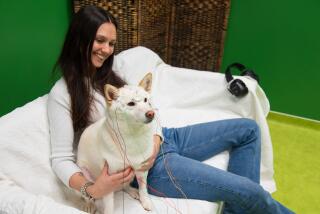Baby’s Little Secret
- Share via
Youprobablydon’trecallhowhardit wasasaninfanttolearnlanguage wheneverywordyouheardseemedto runonintothenextwordlikethis.But itwas. Untilyourearslearnedto start segmenting words like this. Unable to interview infants, researchers are deciphering their linguistic learning process by studying how little ones listen.
The learning starts as early as 4 months, researchers believe, when the baby begins recognizing its own name in the midst of those run-on sentences. Now, they’ve just uncovered a new clue: According to a report in Psychological Science, the next word babies learn may well be whatever comes immediately after their name in that otherwise incomprehensible sound stream. How researchers uncovered this is fascinating and offers a useful new teaching tip for parents and grandparents.
Two years ago, Heather Bortfeld, assistant psychology professor at Texas A&M;, was talking with a colleague about learning Spanish and Latvian. She remarked how one day a foreign word popped out to her ears from the flow of unfamiliar sounds. She seized that word and worked from there, breaking the stream over time into ultimately recognizable parts. Do you suppose babies learn language the same way?
Bortfeld and three colleagues took 24 6-month-old babies in Mom’s lap and, one by one, familiarized them with a series of sentences with names including their own: “The girl rode Maggie’s bike. A clown drank from Hannah’s cup.” The kids turned their heads and listened longer to sentences with their own name.
Fine. Now each child was exposed to four nouns repeated numerous times. Cup, cup, cup, cup. Bike, bike, bike, bike. Tree, tree, tree, tree. Hat, hat, hat, hat. The babies were oblivious to those words until they heard the noun that had followed their own names, when they became focused. Maggie, for example, recognized bike but not cup and Hannah did the opposite.
To Bortfeld, this and other research confirm how interactive, not passive, language learning really is. Plunking an infant in front of a TV, for instance, might teach how to watch TV and gain a short attention span, but without someone saying the familiar name, there are no auditory handles to grab onto, in a language-learning sense.
Previous studies note a correlation between the amount of parental talking to a baby and that child’s later verbal skills: More means better. This new study suggests language learning is easier and quicker when parental talking is frequently punctuated by the child’s name followed by a new word, oft-repeated. Try that on the next baby you encounter. Or on a sleepy spouse tomorrow morning.




